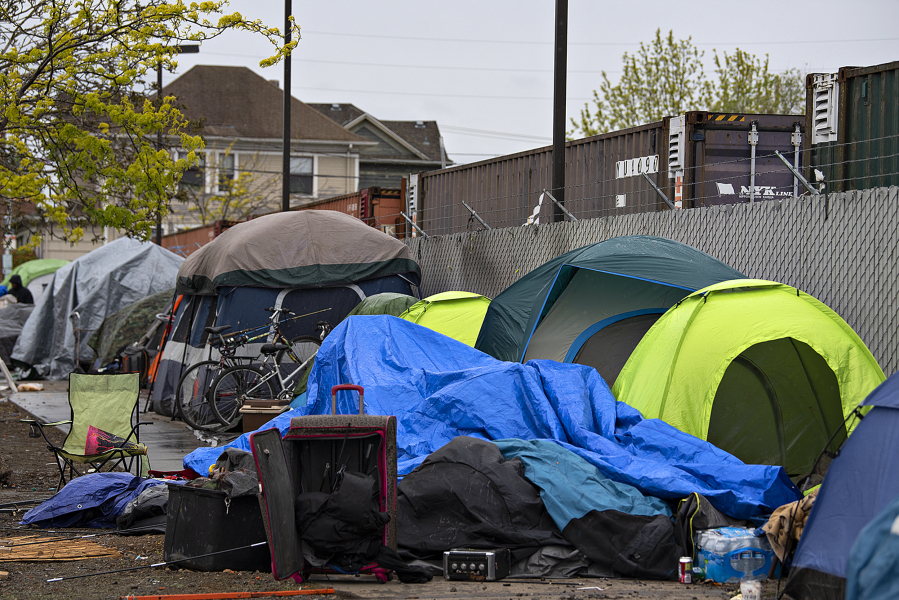The Vancouver community is showing its support for the city’s affordable housing levy, Proposition 3, according to the first set of results released Tuesday night.
So far, voters have favored the levy by a margin of 896 votes, with 12,215 (51.9 percent) votes supporting, and 11,319 (48.1 percent) against the levy. An estimated 17,000 ballots are still waiting to be counted. Voter turnout was 22.44 percent as of Tuesday.
The updated results are expected to come out at 4:30 p.m. Wednesday.
“To have nearly a four-point margin is great on Election Day,” said Alishia Topper, Clark County treasurer and volunteer for the Bring Vancouver Home campaign in support of the levy. “We’re feeling very cautiously optimistic.”
The Bring Vancouver Home campaign made more than 2,000 calls over the last few days to mobilize voters in support of the levy, according to Topper. She thinks the campaign’s efforts helped ensure people came out to vote.
Affordable Housing Fund
Vancouver’s Affordable Housing Fund is the city’s largest local resource for affordable housing. It aims to help house low-income and very low-income residents, such as people with disabilities, veterans, seniors and families with children.
If approved, the property tax levy replacement will raise $100 million over 10 years for affordable-housing development and preservation, temporary shelters, homelessness prevention, and rental and homeownership assistance.
“This is a community that I feel like always is supportive of giving people opportunities and believes that people who live in the community should be able to live (here), no matter if they have a disability or whether they’re working in the service industry,” said Andy Silver, chief operating officer for the Vancouver Housing Authority.
Starting in 2024, if passed, the existing levy will increase from 18 cents to about 30 cents per $1,000 in assessed property value, costing Vancouver homeowners an estimated $150 per year for a home with a $500,000 assessed value.
This is about $60 more per household per year than the current levy. The cost could decrease as the city’s assessed property value grows.
In addition to funding development and preservation of affordable housing and shelters, the levy includes a new homeownership piece, using 5 percent of funds to help very low-income people buy homes.
“If you think about being able to break the cycle of poverty, homeownership is one of the most impactful ways that you can do that because you’re building equity,” Topper said. “And that’s what this fund will enable many households to do over the course of the 10 years.”
If the levy passes, the city will then figure out the details of the homeownership program.
Over 10 years, the fund is estimated to build and preserve more than 2,400 additional affordable homes, provide emergency rent assistance to 2,500 families, support 550 shelter spaces and create homeownership opportunities for 150 very low-income families, according to Bring Vancouver Home.
The current levy, approved by voters in 2016, raises $42 million over seven years, expiring at the end of 2023. So far, the fund has been used to develop or preserve 1,061 affordable units and 450 shelter beds, and has assisted 1,409 households with services, according to city data.
“The Affordable Housing Fund has really been so incredibly important over the last seven years in providing affordable housing and emergency shelter, and even rental assistance to prevent homelessness in our community. So we’re just really hopeful to see that good work continue — if the levy passes,” said Laura Ellsworth, Strategic Partnerships and Advocacy manager for the Council for the Homeless.
The local financial commitment provided by the fund makes projects more competitive for grants at the state and federal levels, giving it strong leveraging power. In its first six years, every dollar invested by the city has been matched by about eight dollars in other funding sources.
“Without the funds, majority of nonprofit developers wouldn’t be able to start construction on these apartments that are so critical to the inventory of our city,” Topper said.
Taxes still a concern for some
Ed Walawender, who contributed to the opposition statement printed in the Clark County Voters’ Pamphlet for the special election, said he’s not surprised by the preliminary election results; but he remains skeptical that higher taxes are the most effective way of addressing the city’s housing and homelessness issues.
“It always can help, but is it in the best interest of everybody involved, particularly the taxpayers? Because they’re the ones that bear the burden,” Walawender said.
Since the levy was enacted in 2017, homelessness rates have more than doubled and housing has gotten more expensive. Fair market rent for a one-bedroom apartment in Clark County has risen 53 percent over the past six years, from $1,053 to $1,610.
“I think city government could be more effective in providing affordable housing for our community for Clark County, all in all, without relying on a tax increase,” Walawender said.
Topper noted that if homeowners, particularly low-income seniors or people with disabilities, are struggling to pay their taxes, they should seek the Clark County Assessor’s Office property tax relief programs.
“For the general public, yes, taxes are tough. But we know as a community, if we invest our tax dollars in a designated fund like the Affordable Housing Levy that we’re going to make a positive impact for generations,” Topper said. “For me personally, that’s a small sacrifice that I’m willing to make, and I hope others will feel the same.”





